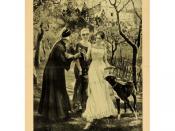Laura Lynn Morris English 1102 Dr. Hornsby Spring 2002 Lust and Adultery in The Changeling Thomas Middleton's tragicomedy, The Changeling, can only be appropriately defined as a tough read. Among the plots and subplots you find characters displaying motives of lust and love, deceit and madness, infidelity and folly. Each line has an underlying meaning. Each underlying meaning carries a purpose. The reading objective is to find meaning and purpose in the play. If, and only if, you are successful in doing so, you will find a play that is, yes, subjective, but also fascinating.
Act I, Scene I begins with Alsemero confiding in his servant, Jasperino. Alsemero is telling Jasperino of his deep infatuation with a young women of high royalty, Beatrice. Alsemero is very careful in his conversation with Jasperino to not speak of Beatrice lustfully, but to make certain that his so-called love for her is all for the right reasons.
Alsemero says, "The place is holy, so is my intent: I love her beauties to the holy purpose, And that methinks, admits comparison with man's first creation, the place blest, and is his right home back, if he achieve it. The church hath first begun our interview, and that's the place must join us into one; so there's beginning, and perfection too" (Middleton. Act I, Scene I, Page 5). He emphasizes that if they are to be married the church will be the basis of their marriage. He adds, "I will keep the same church, same devotion" (Middleton. Act I, Scene I, Page 7).
As well and good as Alsemero's plans of marriage to Beatrice may sound, it is not that easy. Beatrice's father has quite another life planned out for her. Alicante, the father, has elected Alonzo to be married to Beatrice and become his heir. Unsurprisingly, Beatrice is completely objective to the plans considering the fact that she despises Alonzo and in return supposedly in love with Alsemero. "Alonzo stands in the way of marrying Beatrice-Joanna and, within the scope of the play, becoming the rightful heir of Alicante. Alsemero's desire to marry Beatrice-Joanna and for the "restoration" of his status in the upper class are, in effect, one and the same. Alonzo impedes this desire, and Alsemero is willing to kill to remove the block" (Stockton 5). In Act II, Beatrice and Alsemero both goes as far as showing signs of madness to carry out their lustful desires. "The sexual desires of a women is the death weapon" (Stockton 5). It sounds exactly like it happened. "In the second act it is Alsemero who first thinks of killing Alonzo: Bea. How well were I now If there were none such name known as Piracquo, Nor no such tie as the command of parents! I should be but too much blessed.
Als. One good service Would strike off both your fears, and I'll go near it too, I'll send a challenge to Piracquo instantly.
(2.2.18-23, 28)" (Stockton 5).
Beatrice argues with Alsemero that even though Alonzo would be killed in a duel, which at the time would be socially and morally acceptable, it would not be right. "As soon as she learns of Alsemero's intention to kill Alonzo and has spoken against it, she immediately realizes she can have her fiancé killed herself" (Stockton 5).
The killing of Alonzo brings about another complex, complicated saga that exposes Beatrice's true colors. It takes the certain of attention completely away from the murder of Alonzo and all on to the affairs of Beatrice. Beatrice appoints one of her father's servants, DeFlores, who just so happens to be madly in love with her, to help her kill Alonzo. "Although DeFlores actually commits the crime, it is hers that will ultimately be the "fouler visage" which blood-guiltiness becomes" (Stockton 6). Many guesses and many assumptions have been made in trying to figure out exactly what Middleton wants us to know about the affairs of Beatrice and DeFlores. Alsemero believes that Beatrice is as pure as the day is long but will soon be "appalled by her whoredom and her hypocrisy" (Stockton 1). After the killing of Alonzo, Beatrice is to become Alsemero's bride but she has sex with DeFlores on her wedding day. "A practical difficulty she has to face is that Alsemero is likely to discover that, because DeFlores deflowered her, she is no longer a virgin. Hence she persuades Diaphanta, her lady in waiting, to take her place in Alsemero's bed. It does not seem that she and DeFlores are about to give up their sexual relationship, which has existed since the end of act 3" (Daadler 2). Both are apparently "in love" with Beatrice-Joanna, but whereas Alsemero "love[s] her beauties to the holy purpose" (1.1.6), DeFlores desires to "have [his] will "(1.1.240), to "be eased of [her]" (3.4.99), to have sex with her, simply, with pleasure and transgressive possession as his main goals" (Stockton 9). Alsemero becomes aware of the love affairs between DeFlores and Beatrice and by this time the two have admitted to killing Alonzo which once again reverts the attention back to the killing.
Beatrice is none the less an adultress that put on a good front. But, each character displayed lust motives in their own sense. Although DeFlores won her spoken love, nobody was a winner of the war. At the end of the play Beatrice and DeFlores both committed suicide. There was no happily ever after ending in this play, which in all respects is only appropriate.





